Dogbane Beetle
Chrysochus auratus
Classification
- Phylum: Arthropoda
- Subphylum: Hexapoda
- Class: Insecta
- Order: Coleoptera
- Suborder: Polyphaga
- Superfamily: Chrysomeloidea
- Family: Chrysomelidae
- Subfamily: Eumolpinae
- Tribe: Eumolpini
- Genus: Chrysochus
- Species: auratus
Pronunciation
How to pronounce Chrysochus auratus: //ˈkrɪsoʊkəs ɔːˈreɪtəs//
These audio files are automatically generated. While they are not always 100% accurate, they are a good starting point.
Images
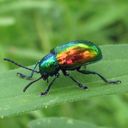
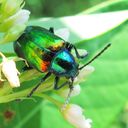
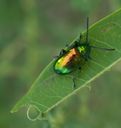
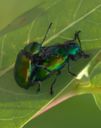

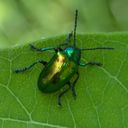
Summary
Chrysochus auratus, known as the dogbane beetle, is a leaf beetle predominantly found in eastern North America, primarily feeding on toxic dogbane plants. This species is notable for its iridescent coloration, adaptations to process plant toxins, and polygamous reproductive habits.
Physical Characteristics
Approximately 8 to 11 mm in length, oblong and convex shape, shiny iridescent blue-green color, bluish black undersurface, with two pairs of wings (copper-colored elytra and membranous hind wings).
Habitat
Primarily found in eastern North America, particularly on dogbane (Apocynum) plants and their associated environments.
Distribution
Transcontinental distribution ranging from the eastern United States (ME-WA to GA-AZ) into adjacent southern Canada, but not west of the Rocky Mountains except in certain hybrid zones.
Diet
Exclusively feeds on dogbane species, particularly Apocynum cannabinum and Apocynum androsaemifolium, as well as roots as larvae and leaves as adults.
Life Cycle
Undergoes one generation per year; larvae drop to the ground, feed on plant roots, pupate in soil, and emerge as adults in early summer.
Reproduction
Mates and lays eggs in summer on the underside of leaves, eggs are placed in masses covered with frass; no parental care except for surrounding eggs with fecal sac.
Ecosystem Role
Potential biological control for invasive dogbane species in agriculture.
Economic Impact
Considered for biological control of Apocynum (dogbane) which interferes with blueberry crops; however, does not effectively control Vincetoxicum rossicum.
Evolution
Interbreeds with Chrysochus cobaltinus in certain areas, resulting in hybrid zones, which is a recent development in distribution.
Similar Taxa
Tags
- beetle
- Chrysochus auratus
- dogbane beetle
- Coleoptera